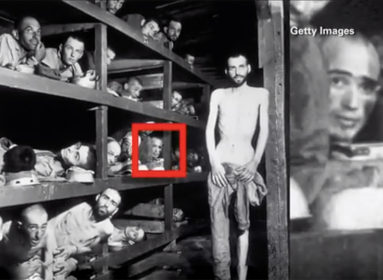
By Benjamin Kerstein
(JNS) In anticipation of Christopher Nolan’s new film “Oppenheimer,” about the man who led the American effort to build the atomic bomb, I have been reading the book American Prometheus, on which the film is based. I was struck almost immediately by the large number of Jews involved in the bomb’s construction.
J. Robert Oppenheimer himself was the son of a German-Jewish family and personified all the contradictions of that identity. He sometimes sought to conceal it outright and never educated himself in any great depth about Judaism. When he saw the first bomb explode in the New Mexico desert, his mind did not turn to the apocalyptic imagery of the Bible but to the Hindu scriptures: “Now I am become death, the destroyer of worlds.”
Oppenheimer was only one of numerous Jews involved in the atom bomb project. Albert Einstein and Leo Szilard kicked it off when they sent a letter to President Franklin Roosevelt warning of the threat of atomic weapons. Also heavily involved were Edward Teller, Richard Feynman, Otto Frisch, Niels Bohr, Felix Bloch and John von Neumann, among others.
These Jews had the best of intentions: They were terrified that the Nazis would get the bomb first, with all the horrors that implied. Nonetheless, there is a terrible irony to these Jews that their non-Jewish counterparts do not share.
In contemplating this irony, I was reminded of an essay by the late Israeli writer Amos Oz titled “The Tender Among You, and Very Delicate.” In it, Oz recounts a conversation with a man he refers to only as “Z.” Oz describes him as “a man with a history” who “apparently did not raise his voice during the most trying moments of those shadowy exploits in his past.”
The implication is that Z. is a former high-ranking military or intelligence figure, though nothing more about him is revealed. In the essay, Z. espouses a far-right, ferociously angry ideology that holds that Israel is justified in doing literally anything to ensure its survival.
Perhaps the most striking moment, however, is when Z. goes beyond Israel and addresses the Jews as a whole: “Listen, friend, if that celebrated Jewish mind had spent less time saving the world, reforming humanity—Marx, Freud, Kafka and all those geniuses, and Einstein, too—and instead had hurried up a bit, only 10 years, and set up a tiny, Lilliputian Jewish state, sort of an independent bridgehead just from Haderah down to Gedera, and invented in time a teeny-weeny atom bomb for this state—if they’d only done those two things—there never would have been a Hitler. Or a Holocaust. And nobody in the whole world would have dared to lay a finger on the Jews.”
“It would have been enough just to have a bomb like that in some Jewish storage shed in a tiny little state back in 1936 or ’39, and no Hitler would have dared to come near a Jew,” Z. asserts. “And those who died would still be alive—they and their offspring.”
In principle, there is little one can argue with in this passage. While it is absurd to think that the Jews could have built an atomic bomb on their own, it cannot be denied that the Jews of the modern world have tended to achieve extraordinary things for other people in return for very little. Oppenheimer, who became a victim of the Red Scare, was one of them.
As Z. puts it, “There’s also cunning in history, a dialectic, irony.”
Indeed, there is no word but irony for the Jews who expend their energies on the world’s behalf only to have the world decide that it doesn’t particularly care—though it is, of course, happy to reap the benefits for itself.
Today, there is a deeper and even more terrible irony at work. If the latest reports are to be believed, the Islamist regime that rules Iran is at most weeks away from a nuclear weapon. All that is required is for the ayatollah to give the order. This regime has stated innumerable times that it intends to use such a weapon to annihilate Israel and its people.
What this means is that a weapon some of the 20th century’s most brilliant Jews labored mightily to build, mainly because they feared Hitler might have it first, could soon be in the hands of Hitler’s heirs, who intend to use it to finish the job their predecessor started.
There appears to be no one willing or able to do what is necessary to prevent the Iranians from becoming death, the destroyer of worlds. Their own people are crushed and powerless. The U.S. is clearly unwilling to act and appears to be preventing Israel from doing so. As for the various countries of Europe and the United Nations, the less said the better.
There is one final irony at work, however. While it may have come too late to save the six million, this tiny Lilliputian Jewish state, from Rosh Hanikra down to Eilat, did acquire what the Jewish people could not in the past. Today, though it has never been publicly admitted, the Jews have their “teeny-weeny atom bomb” and, according to some reports, a great deal more than that.
This is all-important, because a weapon so many Jews worked to build being used to commit a second Holocaust is an irony that cannot be permitted. The Jews today possess the power to insist that it cannot be permitted. They should make use of it, if only as a threat, if only as a reminder to Iran that it is not the only one who can become death, the destroyer of worlds.
Benjamin Kerstein is a writer and editor living in Tel Aviv. Read more of his writing on Substack and his website. Follow him on Twitter @benj_kerstein. His books can be purchased here
PHOTO: The Oppenheimer Irony
CAP: American physicist J. Robert Oppenheimer. Source: public domain/Wikimedia







 Southern New England Jewish Ledger
Southern New England Jewish Ledger













